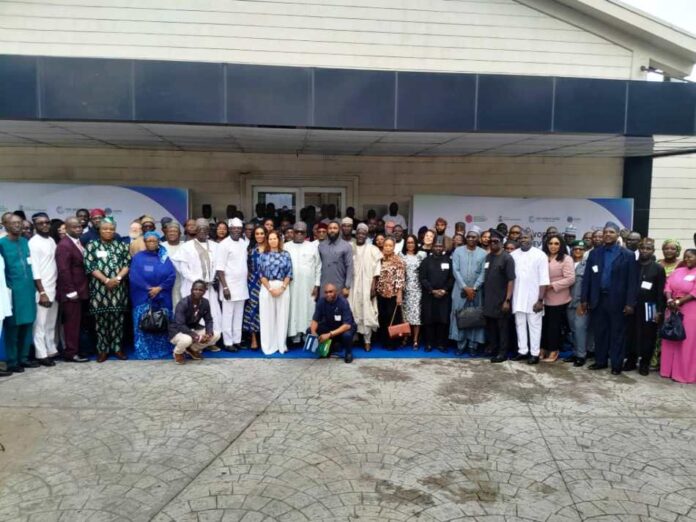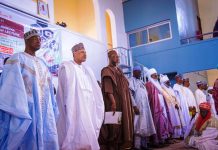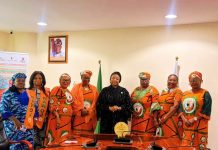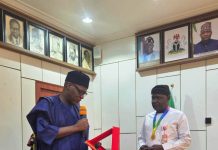The Federal Government has reaffirmed its commitment to the implementation of the RoadMap for the development of the energy transitions and critical minerals value chain in Nigeria.
This was stated by the Honourable Minister of Solid Minerals Development, Dr. Dele Alake, who was represented by the Permanent Secretary, Ministry of Solid Minerals, Engr. Faruk Yusuf Yabo FNSE, while declaring open the two-day Stakeholders Workshop on the implementation of the Roadmap for the development of energy transition and critical minerals value chain in Nigeria.
In his address in Abuja, Dr. Alake said: “Today’s gathering is not just any other technical meeting. It is a strategic milestone in our journey to harnessing the immense potential of our mineral resources at a sustainable level, driving industrialization, and positioning Nigeria as a key player in the global energy position,”
He stressed that the context of the workshop could not be more urgent.
“As we go around the world, the demand for this alongside rare earth elements and other critical inputs for energy transition. Technology is moving at an unprecedented pace. These are the backbones for solar panels, wind turbines, electric vehicles, and their storage systems and, of course, other local technologies.
“And we all noticed that nations can develop competitive, strategic, sustainable, and well governing all value chain stand out to be able to be leading in the emerging clean energy economy. Nigeria is blessed with abundant deposits of these minerals, and our mining sector remains underexposed and largely underdeveloped.”
He also said: “The roadmap we are incorporating today is aimed to change this by (1) attracting investment and, of course, the critical and energy transition mineral value chain from exploration to utilisation (2) Building energy infrastructure and human capital. (3) Strengthening governance, security, environmental compliance, and stewardship. (4) Supporting artisinal and small-scale miners while promoting industrial scale operations. (5) Ensuring that mining benefits flow equitably to our communities and contribute to a broader environment across federal, state, and local governments.
“This workshop is therefore unique because we are adopting a collaborative approach to policy making. In other words, we are today incorporating this particular roadmap. By doing that, we bring together governments, industries, communities, academia, and, of course, our development partners towards shaping the shared vision.”
Alake further noted that the roadmap will complement the Ministry’s seven-point agenda as well as which goes as far as aligning its continental framework such as the African rare mineral strategy and African mining vision thereby ensuring that Nigeria’s voice is strong at regional and global Forums.
He also stated, “On this note, I therefore urge all participants to be open-minded, forward-looking, and practical in our contributions during discussions. Let us identify not just challenges but concrete actionable steps that will enable Nigeria to be competitive around these incorporated value chains towards job creation, industrial linkages,attracting investment, and supporting our commitment to the low-carbon future.”
Likewise, a paper presented by Engr. Obadiah Nkom, Director General, Nigeria Mining Cadastre office titled: Implementation of the 2016 Nigerian RoadMap, Overview of the Mineral Sector dwelt on the historical backgrounds, challenges of sector prior to 2016 RoadMap, Overview of the 2016 RoadMap and status of implementation of the 2016 RoadMap.
According to Engr. Nkom, the historical backgrounds of the Nigerian Mining Sector date back to 1902 when colonial masters commenced organized mining activities.
He said that 1905 marked the establishment of mining surveys, as the first mineral was Classiterite by Royal Niger Company.
“1906 marks the commencement of coal exploration and mining, 1914 marks the discovery of other minerals in commercial quantity, and the second the second mineral mined in commercial quantity was gold in Niger and Kogi States respectively.
“By 1919, there was an establishment of Geological survey as a Department. In 1946, the Mineral Ordinance was constituted. In 1950, coal ordinance resulted in the establishment of Nigeria Coal Corporation by government.
“By 1964, the explosive act was constituted. This continued up to 2024, which brought about Nigerian Mineral Value Chain Regulations.”
Engr. Nkom further stated that the challenges of the sector prior to 2016 roadmap include: Poor Policy initiatives, inadequate geoscience data generation, industry tilted to small-scale miners, limited stakeholders leverage.
He further stressed that some of the objectives of the RoadMap include economic diversification:
The roadmap focuses on reducing economic reliance by developing mining as a key growth sector, increasing mineral production: Efforts aim to boost mineral output to strengthen the mining sector’s contribution to the economy.
Attracting investment and creating jobs: The roadmap seeks to attract financial investment and create employment opportunities in mining.
Sustainable Resource Management: Ensuring responsible use of resources to maintain environmental and economic sustainability.
According to Engr. Nkom, the roadmap implementation time frames were categorised as immediate-Initiative that need to begin right away (June 2016), short-term initiatives between the first 6 months and 2 years of the plan going into Long-term Initiatives-Between years 5 and 10 of the plan.
Ongoing initiatives: Initiatives that span the lifetime of the plan and may be revisited.
He also stressed that the end result of an overview of the 2016 Road Map was mapped as immediate: Launch roadmap and begin communication campaign to generate industry buy-in; Setup Mining implementation and Strategy Team (MIST) to drive execution of the RoadMap.
Design/establish process for strategic planning,
Finalize review-Identify gaps
For the short term: prioritize domestic minerals use & reduce export-Restructure MSMD for efficiency, -Create new regulatory agency,- Review Laws and policies for impact – Incentivize Private investment, and support ASM.
Medium Term: Collaborate with states on mining policy-Strengthen community engagement, harmonise incentive for miners-Encourage formalisation of operations.
Long Term: Expand infrastructure for mining.
Invest in mining community education. Grow Value-added products.
Ongoing: Enforce existing laws & rules
-Enforce labour regulations-collaborate with other MDAs
-Support mineral exploration
-Maintain industry data.
He further revealed that the value addition policy has resulted in the inauguration of a 100 million dollar Lithium battery plant (Avatar Energy) in Nasarawa in May 2024, with a daily capacity of 4,000 tons, expected to create 4,000 jobs. Valuebadfition also resulted in a 600 million dollar Lithium plant near the Kaduna-Niger border (to be commissioned shortly and a 200 million dollar refinery on Abuja outskirts are in advanced stages.
Further to this, NASENI and Rural Electrification Agency signed a 150 million dollar deal in 2023 to build a Lithium-ion battery manufacturing and processing factory.
Also, the World Bank, in its presentations at the workshop, stressed the surging global demand for ETCMs . It further stated that the energy transition could increase demand for minerals like Lithium, cobalt, and rare earth elements by up to 500% by 2050.
The presentation also stressed on Nigeria’s significant potential in ETCMs, noting that Nigeria holds confirmed reserves of Lithium, tin, niobium, tantalum, manganese, iron ore, and lead/zinc.
It further disclosed that Lithium is found across Nasarawa, Kwara, Kogi, and Ekiti States.
According to the World Bank, on account of the strategic urgency amid global supply chain realignment, countries are restoring supply chains and enacting policies like the EU Critical Raw Materials Act- narrowing the window for Nigeria to secure its place in global ETCM value chains. Again, it also noted that on alignment with national industrial policy goals, ETCMs support objectives.
The workshop later went into breakout sessions for more technical deliberations and discussions as well as presentations of their conclusions.
The workshop has in attendance, Director Generals, and CEOs of the Nigerian Solid Mineral Sector, and Directors from other MDAs, representatives of States and Local Governments, development partners particularly the representatives of the world Bank and their partners, industry leaders, members of the academia, and representatives of mining communities.
Signed
Kania Maliki Andeyaba
Head (Press and Public Relations Department )
15/8/2025






